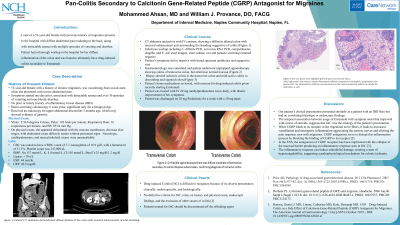Tuesday Poster Session
Category: Colon
P3118 - Pan-Colitis Secondary to Calcitonin Gene-Related Peptide (CGRP) Antagonist for Migraines
Tuesday, October 24, 2023
10:30 AM - 4:00 PM PT
Location: Exhibit Hall

Has Audio

Mohammed Ahsan, MD
NCH Healthcare System
Naples, FL
Presenting Author(s)
Mohammed Ahsan, MD, William Provance, DO
NCH Healthcare System, Naples, FL
Introduction: Drug-induced colitis (DiC) is an inflammatory reaction of the colon secondary to the introduction of a medication. DiC is often difficult to recognize because of its diverse presentation clinically, endoscopically, and histologically. There are no definitive criteria for DiC, and therefore a detailed history and physical exam, endoscopic findings, and the exclusion of other causes of colitis are crucial to make the diagnosis.
Case Description/Methods: A 53-year-old female with a history of chronic migraines, presented with lower quadrant abdominal pain, accompanied by nausea, vomiting, and multiple episodes of non-bloody diarrhea. On abdominal exam, the patient was diffusely tender without peritoneal signs. The patient had a CT abdomen and pelvis, showing a diffusely dilated colon with mucosal enhancement, surrounding fat stranding suggestive of colitis, and terminal ileum mucosal enhancement.
As part of the workup, C. difficile PCR, norovirus RNA PCR, campylobacter, shigella, E. coli stool antigen, stool culture, ova, and parasite screening were ordered, all of which returned negative. IBD was also suspected, given elevated inflammatory markers. Thus, the patient underwent a sigmoidoscopy from the anus to the left transverse colon. The findings were notable for colitis of the transverse colon, but otherwise normal mucosa. Biopsies revealed ischemic colitis in the transverse colon and mild colitis of the descending and sigmoid colon.
After 48 hours, the patient continued to have persistent bowel movements with no improvement in her abdominal pain. A review of the patient’s chart revealed that she was currently on Erenumab. The patient was started on IV methylprednisolone BID, along with dicyclomine. Within 24 hours, the patient had a marked improvement in her symptoms. She continued to improve after 3 days of IV steroids and was discharged with tapered prednisone.
Discussion: We put forward a case of Erenumab-induced colitis in a middle-aged female. Erenumab is a calcitonin gene-related peptide (CGRP) antagonist, used primarily for the purpose of preventing migraines. CGRP receptors are present abundantly in the CNS and PNS, playing a role in the induction of migraine attacks. In the ENS, the antagonism of CGRP receptors has been implicated with the collapse of the mucosal barrier producing an inflammatory reaction seen in DiC. In terms of the pathophysiology, this suggests that Erenumab may not only cause direct cytotoxicity via mucosal damage, but it may also contribute to colonic ischemia.

Disclosures:
Mohammed Ahsan, MD, William Provance, DO. P3118 - Pan-Colitis Secondary to Calcitonin Gene-Related Peptide (CGRP) Antagonist for Migraines, ACG 2023 Annual Scientific Meeting Abstracts. Vancouver, BC, Canada: American College of Gastroenterology.
NCH Healthcare System, Naples, FL
Introduction: Drug-induced colitis (DiC) is an inflammatory reaction of the colon secondary to the introduction of a medication. DiC is often difficult to recognize because of its diverse presentation clinically, endoscopically, and histologically. There are no definitive criteria for DiC, and therefore a detailed history and physical exam, endoscopic findings, and the exclusion of other causes of colitis are crucial to make the diagnosis.
Case Description/Methods: A 53-year-old female with a history of chronic migraines, presented with lower quadrant abdominal pain, accompanied by nausea, vomiting, and multiple episodes of non-bloody diarrhea. On abdominal exam, the patient was diffusely tender without peritoneal signs. The patient had a CT abdomen and pelvis, showing a diffusely dilated colon with mucosal enhancement, surrounding fat stranding suggestive of colitis, and terminal ileum mucosal enhancement.
As part of the workup, C. difficile PCR, norovirus RNA PCR, campylobacter, shigella, E. coli stool antigen, stool culture, ova, and parasite screening were ordered, all of which returned negative. IBD was also suspected, given elevated inflammatory markers. Thus, the patient underwent a sigmoidoscopy from the anus to the left transverse colon. The findings were notable for colitis of the transverse colon, but otherwise normal mucosa. Biopsies revealed ischemic colitis in the transverse colon and mild colitis of the descending and sigmoid colon.
After 48 hours, the patient continued to have persistent bowel movements with no improvement in her abdominal pain. A review of the patient’s chart revealed that she was currently on Erenumab. The patient was started on IV methylprednisolone BID, along with dicyclomine. Within 24 hours, the patient had a marked improvement in her symptoms. She continued to improve after 3 days of IV steroids and was discharged with tapered prednisone.
Discussion: We put forward a case of Erenumab-induced colitis in a middle-aged female. Erenumab is a calcitonin gene-related peptide (CGRP) antagonist, used primarily for the purpose of preventing migraines. CGRP receptors are present abundantly in the CNS and PNS, playing a role in the induction of migraine attacks. In the ENS, the antagonism of CGRP receptors has been implicated with the collapse of the mucosal barrier producing an inflammatory reaction seen in DiC. In terms of the pathophysiology, this suggests that Erenumab may not only cause direct cytotoxicity via mucosal damage, but it may also contribute to colonic ischemia.

Figure: Figure A and B: Patient’s CT abdomen demonstrated diffuse dilation of the colon with mucosal enhancement and fat stranding.
Figures C and D: Shown are images of the transverse colon on flexible sigmoidoscopy demonstrating diffuse, moderate inflammation secondary to colitis.
Figures C and D: Shown are images of the transverse colon on flexible sigmoidoscopy demonstrating diffuse, moderate inflammation secondary to colitis.
Disclosures:
Mohammed Ahsan indicated no relevant financial relationships.
William Provance indicated no relevant financial relationships.
Mohammed Ahsan, MD, William Provance, DO. P3118 - Pan-Colitis Secondary to Calcitonin Gene-Related Peptide (CGRP) Antagonist for Migraines, ACG 2023 Annual Scientific Meeting Abstracts. Vancouver, BC, Canada: American College of Gastroenterology.
